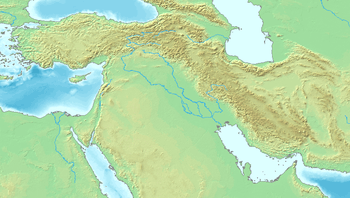Enannatum II
Enannatum II (Sumerian: 𒂗𒀭𒈾𒁺, EN.AN.NA-tum2), son of Entemena, was Ensi (governor) of Lagash.[2][3]
| Enannatum II 𒂗𒀭𒈾𒁺 | |
|---|---|
| Governor of Lagash | |
.jpg) Mace head with the eagle of Lagash, dedicated to the life of Enannatum, possibly Enannatum II.[1] | |
| Reign | c. 2400 BC |
| Predecessor | Entemena |
| Successor | Enentarzi |
| Dynasty | 1st Dynasty of Lagash |
Only a few inscriptions of Enannatum II are known, suggesting a short reign.[4][5] One of these inscriptions, of which four nearly identical instances are known,[6] appears on a door socket from the great storehouse of Ningirsu at Lagash, which he restored:[7]
For Ningirsu, the foremost warrior of Enlil. Enannatum, the ensi of Lagash, whom Nanshe had chosen in her heart, the great ensi of Ningirsu, the son of Entemena, the ensi of Lagash, restored for Ningirsu his brewery. The god of Enannatum, the man who restored the brewery, is Shulutula
— Door socket inscription of Enannatum II.[8]
He had a son named Lummadur, the last representative of the house of Ur-Nanshe, who apparently never held an official title.[9] It seems that the power of Lagash waned at this point, and that other territories such as Umma ("Gishban") and Kish prevailed.[9]
Enannatum II was the last member of the family of Ur-Nanshe.[10] He was succeeded by a priest named Enentarzi.[3]
 Door socket dedicated to Ningirsu by "Enannatum, ensi of Lagash (...) son of Entemena", hence Enannatum II, grandson of Enannatum I.[12]
Door socket dedicated to Ningirsu by "Enannatum, ensi of Lagash (...) son of Entemena", hence Enannatum II, grandson of Enannatum I.[12]
See also
.svg.png)
References
- Art of the First Cities: The Third Millennium B.C. from the Mediterranean to the Indus. Metropolitan Museum of Art. 2003. pp. 75–76. ISBN 978-1-58839-043-1.
- Crawford, Harriet (2013). The Sumerian World. Routledge. p. 23. ISBN 978-1-136-21912-2.
- Gonnet, Hatice; Breniquet-Coury, Catherine; Garelli, Paul; Durand, Jean-Marie (2015). Le Proche-Orient asiatique. Tome 1: Des origines aux invasions des peuples de la mer (in French). Presses Universitaires de France. p. 144. ISBN 978-2-13-073719-3.
- Radau, Hugo (2005). Early Babylonian History: Down to the End of the Fourth Dynasty of Ur. Wipf and Stock Publishers. pp. 119–120. ISBN 978-1-59752-381-3.
- Gadd, C. J.; Edwards, I. E. S.; Hammond, N. G. L. (1970). The Cambridge Ancient History. Cambridge University Press. p. 220. ISBN 978-0-521-07051-5.
- "Q001120". cdli.ucla.edu. Cuneiform Digital Library Initiative.
- Jones, C. H. W. (2012). Ancient Babylonia. Cambridge University Press. p. 34. ISBN 978-1-107-60572-5.
- Kramer, Samuel Noah (1971). The Sumerians: Their History, Culture, and Character. University of Chicago Press. p. 316. ISBN 978-0-226-45238-8.
- Radau, Hugo (2005). Early Babylonian History: Down to the End of the Fourth Dynasty of Ur. Wipf and Stock Publishers. p. 120. ISBN 978-1-59752-381-3.
- Jones, C. H. W. (2012). Ancient Babylonia. Cambridge University Press. p. 34. ISBN 978-1-107-60572-5.
- Art of the First Cities: The Third Millennium B.C. from the Mediterranean to the Indus. Metropolitan Museum of Art. 2003. pp. 75–76. ISBN 978-1-58839-043-1.
- Full transliteration "CDLI-Archival View". cdli.ucla.edu. Cuneiform Digital Library Initiative.
- Full transliteration "CDLI-Archival View". cdli.ucla.edu. Cuneiform Digital Library Initiative.
| Regnal titles | ||
|---|---|---|
| Preceded by Entemena |
King of Lagash c. 25th century BCE |
Succeeded by Enentarzi |
